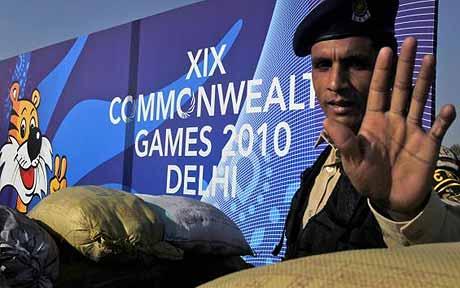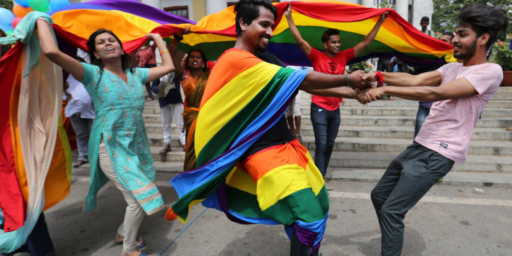Commonwealth Games Highlight Wealth Disparity
Western athletes who've complained about the conditions at the Commonwealth Games are coming in for a firestorm of criticism.
As many of you are doubtless aware, there has been a minor flap in recent days as athletes from around the world have threatened to boycott the Commonwealth Games, citing unsafe conditions in Dehli. A few stars have indeed pulled out of the games and some 400 others who have showed up have gone to the infirmary for various ailments related to the sheer squalor of the place. And the Australian government has issued a security alert citing high risk of terrorist attacks.
Edward H. Carpenter, the editor of La Riposte, says this is a case of Slumdogs vs. Millionaires, as athletes from wealthy nations whine about conditions far better than that in which millions of Indians live on a daily basis.
The real story, that of thousands of poor Indians being displaced as their slums were razed by bulldozers to make Commonwealth athlete and guest housing more presentable was hijacked by the steady stream of athletes boycotting the games because the housing and security (from accidents, crime, and disease) were not up to Western standards. But the housing, security, and healthcare available to those athletes, even under the worst circumstances, are an order of magnitude better than the majority of citizens in the host country are obliged to live with every day – and similarly considerably better than many citizens of visiting Commonwealth countries such as Bangladesh, Cameroon, Malaysia, and Nigeria.
Notably, the countries complaining about the conditions in New Delhi have nearly all been from the more privileged of the Commonwealth nations – those with predominantly white populations and high standards of living. The source of the problem can be seen by looking back at the start of the games – which were originally called the British Empire Games in 1930, and only took on their new and somewhat more egalitarian title in the 1960s. But the real problem is the dual standard that remains worldwide as a result of the colonial imperialism without which, there would be no games, and no problem.
Colonial possessions, including India were systematically exploited for resources, a trend that continues to this day, and there is some irony in the fact that a nation where so many still live in abject poverty would spend 7.5 billion dollars on an athletic event where the only common bond shared by most of the 54 member states is that they were colonized or had their indigenous population exploited by Great Britain for over a century.
Perhaps these games will serve to highlight for the privileged upper-class of the world that the conditions under which they would not deign to live for a few weeks are the daily reality for billions of their fellow humans around the world who live on less than $1.25 per day.
Charli Carpenter [so far as I know, no relation] terms the athlete’s whining “hypocrisy,” especially in light of last week’s bridge collapse. But that’s a non sequitur. The fact that there are millions of people living in squalid and unsafe conditions may make this controversy a teachable moment. But, surely, athletes from societies that are comparative healthy have no moral obligation to subject themselves to significant hazards just because others have it rough? Cambodian children risk getting limbs blown off by decades-old land mines on a daily basis. Nobody’s proposing holding the next Olympics on those fields to teach the bloody white bastards a lesson.
Not to be outdone, Spiked editor Mick Hume takes to the pages of The Australian to insinuate that all the complaints are mere racism or some desire to put the uppity wogs in their place.
Why did the British non-sporting media suddenly splash sensational stories of “filthy” living quarters and unfinished buildings and “reports” that foreign athletes could be at risk from attack by everything from dengue fever and snakes to terrorists? Because it gave the old boys of the Mother Country a rare opportunity to look down on the uppity Indians.
[…]
This shitstorm of self-righteousness about bad smells and a broken bed seems a bit pathetic, really. Once the rulers of the British Empire justified keeping their dark-skinned subjects in their place through the politics of national and racial superiority, backed up by the military might of the Royal Navy and the army. Now it seems the only ideological weapons they have to demonstrate the alleged inferiority of Indians are the whiny politics of the health-and-safety police.
The Commonwealth Games are, of course, themselves a symbol of the decline of Britain’s power and influence in the world, and the problems this poses for the elites in knowing who they are anymore. The idea of a sporting competition for the nations of the British Empire was first proposed at the peak of its Victorian power in The Times in 1891, as a “Pan-Britannic-Pan-Anglican Contest and Festival every four years as a means of increasing the goodwill and good understanding of the British Empire”.
[…]
As comedian Frankie Boyle observed last week, the migrant labourers building these facilities have been paid a pittance and forced to live in grim camps while they labour to make nice luxury apartments for teenage gymnasts and synchronised swimmers. In which case, it might seem entirely reasonable if they had crapped in the beds and hooked the electricity up to the taps.
One British team’s official, arriving after the emergency clean-up operation in the athlete’s village, observed sniffily that the facilities were still three-star rather than five-star. Yet even three-star comforts seem rather too soft for what are meant to be hard young men and women athletes at the peak of their fitness. Surely, something a bit more Spartan would be appropriate.
Why not stick them in bunk beds in old-fashioned military barracks? After all, that was what the hard-up British authorities did with male competitors at the 1948 London Olympics. Although they did generously allow the athletes a bit of extra grub in those dark days of postwar rationing.
The juxtaposition of privileged athletes and indescribably poor folks doing the dirty work in advance of their visit is stark. But it’s not at all clear why 20-something world class athletes are culpable for the sins of the colonial era. It’s hardly unreasonable that, if the norm at these things is first rate accommodations, that they’d recoil at filth, stench, and disease — irrespective of what the brave lads of ’48 endured.







There’s certainly something fairly unedifying about the whole “This is three star, not five” stuff. But beyond that, I think there’s quite a lot of hot air here.
India is a rising power with growing pretensions as a major player on the world stage. It is currently undergoing a major military expansion, is growing its high tech research base and can find the funds to operate an independent space programme. Britain, meanwhile, has pledged to increase poverty relief aid to India and is underwriting the roll-out of the power grid to rural parts of the country, even as its research base and military shrink in both absolute and relative terms. India pitched to host the Games, was awarded the opportunity to to do so, an opportunity which was cheerily hailed as part of India’s stepping out onto the top tier of the international arena, and appears to have made a pig’s ear of it. And the thing to take away from this is that British people are patronising racists?
And apparently, the Indian use of cheap workers and the forced demolition of homes is a harrowing testament to the insensitivity of Britain and the ANZAC countries, even though the world collectively gave a massive shrug over China’s widespread use of exactly the same formula with the admixture of forced labour during the Beijing Olympics.
I don’t believe for an instant that American athletes would have pitched up in China if the housing on offer was unfinished, waterlogged and often not fitted with lavatory plumbing. I don’t think it’s a defence of imperialsm to say that as far as I’m concerned, if there’s hypocrisy in evidence a fair chunk of it is coming from American commentators who appear to have decided that the Commonwealth Games shouldn’t exist on principle in the first place and that this is a good opportunity to display their gleaming anti-imperialist credentials. I’m not a great follower of international sports, so I don’t know if there are any major All Americas tournaments out there, but if there are, I’ll have more sympathy the day the same commentators view the proceedings through the lens of the United Fruit Company, death squads and lots of handicapped Guatamalans being forcibly infected with syphilis.
Maybe this was just too much too soon for India. Perhaps that $6 billion would have been better spent on infrastructure improvements or health care programs for India itself instead of trying to show off with a large sporting event.
My recent letter which appeared on La Riposte and in the Jakarta Post was not meant to suggest that a handful of modern athletes are “culpable for the sins of the colonial era”, or to suggest that “bloody white bastards” need be taught some sort of lesson.
Far from it. But when a professional and educated individual in any profession is presented with “filth, stench, and disease” – is the appropriate action to recoil (and avoid the source) or roll one’s sleeves up and do whatever is in their power to address the root cause?
Obviously, that nature of what that may entail would vary – doctors, nurses, or janitors might address the filth and disease directly – but a nationally-ranked athlete has the benefit of a bully pulpit with which to highlight the root problems and in this instance, those soapboxes have been used only for self-serving announcements of withdrawal, and not to help raise awareness or funds that might improve the lot of their fellow men and women.
Also, I rather believe it is a stretch to equate spending a fortnight in a building with mildewed walls and dodgy plumbing to playing an Olympic sport in an uncleared minefield. Certainly I never suggested the Commonwealth athletes should live in the same conditions as poor Indians, since if that was the case, they’d most likely be living under a tarp or corrugated tin roof, with a dirt floor, and the local river for a bathroom. However, I suggested that they consider their lodgings, mere 3-star rating that the might obtain, to be so far superior to those in which billions of their fellow human beings their entire lives that they might be able to endure them for a matter of weeks.
@Edward: Thanks for taking time to respond.
Your piece struck me as reasonable enough, as it pointed out the rather large elephant in the room: The huge contrast between the lives of rich athletes and poor Indians. Charli extended from their, without explanation, into calling the athletes hypocrites and then Mick Hume went into a full on rant about the colonial days.
I’m not at all sure that athletes from wealthy nations owe their toil, voice, and sacrifice to those less fortune in the developing world. Doubtless, some will speak out and perhaps a few will be motivated to philanthropy by their firsthand exposure to genuine poverty. Perhaps loudly moaning about their own fates is unseemly but it’s hardly horrendous.
For that matter, if people are genuinely getting sick merely waiting around to compete, I think they’re entitled to boycott. These folks have spent their whole lives training their bodies to operate at peak efficiency. Why should they risk their health because some genius decided to award the games to a city unable to deliver a world class venue?